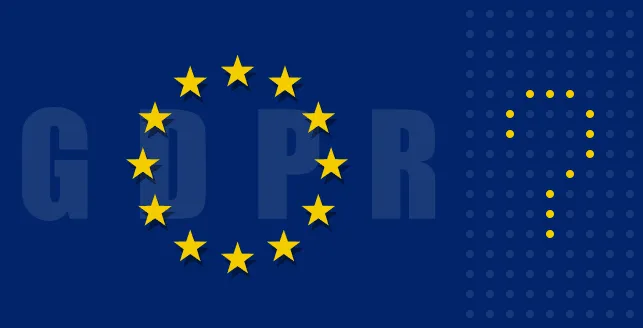
General Data Protection Regulation, generally known as GDPR is a comprehensive data privacy regulation implemented by the European Union (EU) in May 2018.
The GDPR aims to strengthen and unify data protection laws for individuals within the EU and regulate the export of personal data outside the EU and European Economic Area (EEA).
Points to remember in GDPR
You must know several things before diving into the GDPR. Some of the key highlights of GDPR are as follows:
Consent: Organizations must obtain clear and explicit consent from individuals before collecting or processing their personal data.
Data minimization: Organizations should only collect and process personal data necessary for specified purposes.
Data accuracy: Personal data must be accurate and kept up to date.
Purpose limitation: Personal data should only be collected for specific, explicit, and legitimate purposes and not further processed in a manner incompatible with those purposes.
Data security: Organizations must implement appropriate technical and organizational measures to ensure personal data security.
Data subject rights: The GDPR grants individuals certain rights over their personal data, including the right to access, rectification, erasure, and portability.
Data breach notification: Organizations must notify relevant supervisory authorities and affected individuals of data breaches within specific timeframes.
Accountability and governance: Organizations are responsible for demonstrating compliance with the GDPR and must maintain records of data processing activities.
The GDPR applies to all organizations that process the personal data of individuals within the EU, regardless of the organization’s location.
This includes businesses, government agencies, non-profits, and other entities that collect or process personal data.
Understanding GDPR
Understanding the General Data Protection Regulation (GDPR) is crucial for anyone involved in handling personal data, whether it be as an individual, a business, or an organization. Here’s a comprehensive overview:
1. Scope
The GDPR applies to all organizations that process the personal data of individuals residing in the European Union (EU), regardless of where the organization is located.
It also applies to organizations outside the EU that offer goods or services to individuals in the EU or monitor their behavior.
2. Key principles
Lawfulness, fairness, and transparency: Personal data must be processed lawfully, fairly, and transparently.
Purpose limitation: Personal data should be collected for specified, explicit, and legitimate purposes and not further processed in a manner incompatible with those purposes.
Data minimization: Only the personal data necessary for the specified purposes should be processed.
Accuracy: Personal data must be accurate and kept up to date.
Storage limitation: Personal data should be kept in a form that permits identification of data subjects for no longer than is necessary for the purposes for which the data is processed.
Integrity and confidentiality: Personal data must be processed in a manner that ensures appropriate security, including protection against unauthorized or unlawful processing and against accidental loss, destruction, or damage.
3. Data subject rights
Right to access: Individuals have the right to confirm whether personal data concerning them is being processed and, if so, access to that data.
Right to rectification: Individuals can request the correction of inaccurate personal data.
Right to erasure (“right to be forgotten”): Individuals have the right to have their personal data erased under certain circumstances.
Right to data portability: Individuals can request their personal data in a structured, commonly used, and machine-readable format, and have the right to transmit that data to another controller.
Right to object: Individuals have the right to object to the processing of their personal data in certain situations.
Data Protection Officer (DPO): Some organizations are required to appoint a Data Protection Officer (DPO) to oversee GDPR compliance, particularly those that process large amounts of sensitive personal data or engage in systematic monitoring of individuals.
Data breach notification: Organizations must report certain types of personal data breaches to the relevant supervisory authority within 72 hours (about 3 days) of becoming aware of the breach, unless the breach is unlikely to result in a risk to the rights and freedoms of individuals.
Penalties: Non-compliance with the GDPR can result in fines of up to €20 million or 4% of the organization’s worldwide annual turnover, whichever is higher, depending on the nature and severity of the violation.
Understanding and complying with the GDPR is essential for organizations to protect the privacy rights of individuals and avoid significant fines and penalties.
It requires a proactive approach to data protection, including implementing appropriate technical and organizational measures to ensure compliance with the regulation.
What are the challenges to GDPR?
While GDPR has been widely praised for enhancing data protection standards, it also faces several challenges:
1. Global compliance
One of the major challenges is ensuring global compliance, particularly for multinational companies that operate across various jurisdictions. Achieving consistency in data protection practices across different regions with varying regulations can be complex and costly.
2. Interpretation and enforcement
The GDPR’s principles and requirements can sometimes be open to interpretation, leading to inconsistency in enforcement across EU member states. Ensuring uniform interpretation and enforcement poses a significant challenge, especially considering the decentralized nature of enforcement authorities.
3. Complexity and compliance costs
Compliance with GDPR requires significant resources in terms of personnel, technology, and training. Small and medium-sized enterprises (SMEs) and startups may struggle to allocate the necessary resources to achieve compliance, potentially hindering their competitiveness.
4. Data transfers outside the EU
GDPR imposes strict regulations on transferring personal data outside the EU, necessitating adequate safeguards and mechanisms to ensure the protection of data. This poses challenges for international data transfers, especially for businesses that rely on global data flows.
5. Technological advancements
Rapid advancements in technology, such as artificial intelligence (AI), machine learning, and big data analytics, present challenges in applying GDPR principles to emerging technologies.
Ensuring that data processing practices align with GDPR requirements while harnessing the benefits of technological innovation remains a significant challenge.
6. Data breaches and cybersecurity
Despite GDPR’s emphasis on data security and breach notification requirements, data breaches continue to occur, raising concerns about the effectiveness of security measures implemented by organizations.
Ensuring robust cybersecurity practices to prevent data breaches and mitigate their impact is an ongoing challenge.
7. Consent management
Obtaining valid consent for data processing activities is a fundamental requirement under GDPR. However, ensuring that consent is freely given, specifically, informed, and unambiguous poses challenges, particularly in online environments where consent mechanisms can be complex and opaque.
8. Data Protection Authorities (DPAs) capacity
Data Protection Authorities (DPAs) play a crucial role in enforcing GDPR and providing guidance to organizations.
However, some DPAs may face resource constraints, including limited funding and staffing, which could affect their ability to effectively enforce GDPR and respond to complaints and inquiries.
How does Beagle Security help you with your GDPR compliance report
Beagle Security ensures continuous security standards like GDPR, HIPAA, and PCI DSS thus aligning with the requirements of the different compliance standards.
Beagle provides specifically mapped detailed compliance reports for all the compliance standards.
In GDPR compliance, Beagle Security detects the vulnerabilities in your systems that could potentially lead to a data breach. Beagle also conducts audits to assess whether organizations’ cybersecurity practices align with GDPR regulations.
In addition, the report offers actionable recommendations for addressing identified issues and improving overall security resilience. It serves as a roadmap for security improvement initiatives, guiding the organization towards achieving and maintaining compliance with relevant security standards and regulations
With the high-level visibility into scan vulnerabilities, the GDPR report can empower management and developers to effectively address security gaps!
![Best tools for SOC 2 compliance penetration testing [2025] Best tools for SOC 2 compliance penetration testing [2025]](/blog/images/blog-banner-two-cover.webp)

![Best tools for HIPAA penetration testing [2025] Best tools for HIPAA penetration testing [2025]](/blog/images/blog-banner-one-cover.webp)



